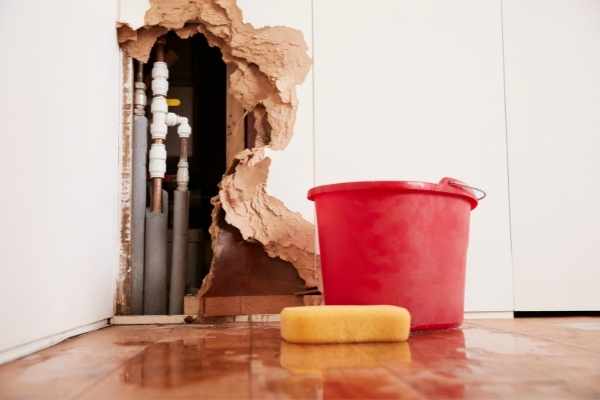|
It is not ideal for water in your home to pool up anywhere outside of your showers, toilets, sinks, dishwasher, and washing machine. If so, it could result in mold growth or wood rot, and it could compromise your indoor air quality.
However, there may come a time when you have to deal with a broken or leaking plumbing pipe. Understanding the common causes, the warning signs, and how best to handle these types of plumbing issues, can help prevent them and even save you money in the event you have to file an insurance claim. Common Causes & Signs of Pipe Bursts or Leaks Being aware of the common causes of broken, leaking or a burst pipe can help you better maintain them and help you potentially avoid these issues altogether. Below are a few common causes. Clogged Pipe If there is a clog and a substantial amount of water pressure is increasing around the clog, it could result in a burst pipe. This usually happens when the clog is deep down in the pipe and it will symptomatically leak at first. There may be plumbing trouble ahead if you notice any of the following signs: ● Puddling under the pipes when you turn on the water ● Low water pressure ● Stains on the walls or flooring ● Water discoloration or foul odors ● Significant increase in your water bill Corroding Pipes This is typically a result of an imbalance in your water’s pH or rust compromising the pipe’s durability over a significant amount of time. Freezing Pipes Though freezing is not common in Florida, your water pipes are sometimes an exception. Water in the pipes can freeze if temperatures fall below freezing (32 degrees Fahrenheit) weakening the bonds in the pipe, resulting in cracks. Conversely, if the water is too hot when the pipes are frozen, it could cause the pipe to burst. Important Steps to Take If Your Pipe Bursts If you notice the warning signs mentioned above or that a pipe has burst or is leaking, the first step to take is to shut off the water. This will stop any additional water from infiltrating your space and will lessen the damage to your property and belongings. It is extremely important to document the condition of the damage with photos and videos before you take the next steps. Be sure to call your public adjuster, as they can help document your damage with photos, review your insurance policy and explain all of your coverages. Next, you should work to remove any standing water by mopping or using a shop vac so it does not cause further damage. Depending on the amount of water, you may need to call a professional mitigation company to remove the water from your property and begin to dry your property. This will also prevent further damage and the potential for mold growth. Call your plumber to fix the broken pipe. It is important that you do not discard the broken parts and preserve the evidence. In many instances, your insurance company will require you to prove your damage, and that includes what caused the damage. In the event you do have an insurance claim, your public adjuster will prepare an estimate of the damage and the required proof of the loss and will help ensure that your claim is properly documented and hold the insurance company accountable to pay for all the resulting damages. Other companies may offer similar services, but Reliant is dedicated to providing the professionalism, experience, knowledge and resources to get you the highest possible settlement of your insurance claim. Contact us today to help you get started with yours.
0 Comments
Leave a Reply. |
AuthorKaren Schiffmiller Archives
July 2024
Categories |





